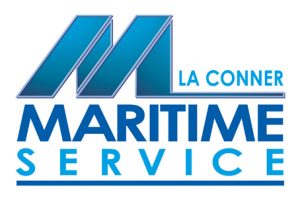Interview with La Conner Maritime on Finding Perfect Employees
 No matter what business you’re in, making sure you hire the right people is no easy feat. What makes a good employee? On the most basic level, it’s someone who cares about the business, has willingness to learn, and of course, does the job and does it well.
No matter what business you’re in, making sure you hire the right people is no easy feat. What makes a good employee? On the most basic level, it’s someone who cares about the business, has willingness to learn, and of course, does the job and does it well.
If you’re running a full-service boatyard that also happens to build boats, as is the case with La Conner Maritime, then the task of finding the right people becomes even tougher. However, with the right tools, nothing is insurmountable, which is why La Conner Maritime is one of the most successful boatyards around.
We’ve recently had the pleasure of chatting with Alice Widtfeldt, the Compliance Officer at La Conner Maritime, who, after consulting with her colleagues, shared with us the operation’s secret to employee efficiency. Find out what it is in our interview with her below!
What can you tell us about La Conner Maritime?
Alice: “We have grown from building and repairing commercial fishing deck gear (gillnetting) and fishing vessels in 1978 to a full-service boatyard in 1992, working on vessels that range from 20 to 80 feet.
We offer full services for pleasure craft and commercial fishing vessels, including custom fabrication in fiberglass or metal, building commercial fishing deck gear and fishing vessels as well as fabricating a specialty product for oil boom recovery. Finally, we have a product called Hide-A-Davit, which is a tender launch and retrieval system. So, we are pretty diverse.”
What is your biggest competitive advantage?
Alice: “We have exceptional people with a professional approach to their work and relationships with customers, possessing a broad range of skills. If you are a boat owner and you want to be able to go to one place where you can get the full range of services with confidence that it will be done right, our boatyard is a perfect choice for you.”
How do you go about finding people who fit your business?
Alice: “One of the challenges is to know, at the time of screening, if the person you’re hiring shares the company values. And sometimes you win, and sometimes you have to try again.
We are very proud of the fact that we have people who have been with the company since 1993. It’s very important for us, and our customers, to retain our most valued employees.”
What do you think allows you to retain your employees for that long?
Alice: “A couple of factors are involved in that. To some extent, it’s the culture of the company. We are a small-to-medium-sized, family-owned business, and those family values come forward in the company.
Another other factor is our ability to maintain a constant work flow. No matter how good the company is or the employees are, if the work is not there – it’s not there.
By retaining outstanding employees, we maintain the reputation of the company. This results in repeat and referred customer business, which in turn provides enough work to retain the employees.”
What do you think is the biggest mistake that other businesses make when it comes to providing customer service?
Alice: “Failing to hire employees who care about your customers enough to do a good job or handle customer service issues appropriately. It’s very important to communicate well with a customer. If a customer brings in their boat for service work, and as you work on it, you discover additional issues, you need to keep that customer in the loop to avoid any unpleasant surprises.”
What are some of the biggest challenges of running a boatyard like this?
Alice: “One is getting good people. And the other is complying with various government regulations. This is something we do, and we take it responsibly, but of course, it can be challenging.”
When did you get Ideal, and what was the initial reason for getting it?
Alice: “We migrated to Ideal in October of 2013. Before that, we were using Marine Soft, which as you know, is a DOS-based system, unlike Ideal, so it wasn’t very easy to navigate. For example, if you wanted to look up a part, you had to go into it, then if you wanted to look up customer information, you had to back clear out and go into that, then back clear out to look at the work order, and so on.
With Ideal, you can easily switch back and forth between all these different areas, which makes multi-tasking considerably faster. In addition, you can use a mouse with it, which wasn’t possible with Marine Soft due to its DOS-based nature.”
What was the transition from Marine Soft to Ideal like, especially as far as data is concerned?
Alice: “I would say, on the whole, it was very smooth – and I’ve been through numerous transition processes in the past. I say that not only from the user standpoint, but from the technical standpoint. Of course, there was a learning curve on the usage, but as far as data transition is concerned, everything was pretty smooth.”
What were some of the other differences between Marine Soft and Ideal?
Alice: “Everything is tied together – you can create an estimate, you can convert it into a work order, you can schedule the work, and while you’re at it, you can look up customer and part information right from the work order.
You also have the ability to e-mail invoices, orders and other information right from the software, which is very helpful since more and more people prefer electronic communication to snail mail.
Marine Soft certainly didn’t tie everything together like this.”
In what areas was Ideal helpful to you so far, and what are some of your favorite features?
Alice: “Product and sales orders. You can see the information about each product in the orders. We also have been using the time clock feature, which helps us track how long an employee takes to do a particular job. All of this helps us save a lot of time and money.”
So, what’s in store for La Conner Maritime in the future and what role will Ideal play in that?
Alice: “Hopefully, we will continue to grow and provide reliable service to our customer base – and grow that customer base.
And as far as Ideal goes, it will play a big part in our future. Additional enhancements that are specific to marine industry and enhanced features that are based on different mobile devices should make them an even stronger business partner.”

